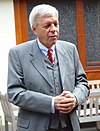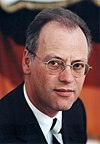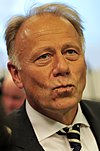Schröder I cabinet
| Schröder I cabinet | |
|---|---|
| 19. Cabinet of the Federal Republic of Germany | |

|
|
| Chancellor | Gerhard Schröder |
| choice | 1998 |
| Legislative period | 14th |
| Appointed by | Federal President Roman Herzog |
| education | October 27, 1998 |
| The End | October 22, 2002 |
| Duration | 3 years and 360 days |
| predecessor | Cabinet Kohl V |
| successor | Schröder II cabinet |
| composition | |
| Party (s) | SPD, Alliance 90 / The Greens |
| minister | 15th |
| State Secretaries | 27 |
| representation | |
| German Bundestag | 345/669 |
| Opposition leader | Wolfgang Schäuble ( CDU ) until February 29, 2000
Friedrich Merz ( CDU ) from February 29, 2000 to September 24, 2002 Angela Merkel ( CDU ) from September 24, 2002 |
" Cabinet Schröder I " is a common name for the first red-green federal government of the Federal Republic of Germany , which was in office from October 27, 1998 to October 22, 2002. It was formed after the election to the 14th German Bundestag on September 27, 1998 and replaced the Kohl V cabinet .
From the federal election that went SPD and Alliance 90 / The Greens emerged as the winner. Together they formed a government and ended the "Kohl era"; the alliance of the Union parties ( CDU and CSU ) with the FDP , led by Chancellor Helmut Kohl (CDU), had to join the opposition after 16 years of government responsibility.
On October 27, 1998, Gerhard Schröder was elected the seventh Federal Chancellor of the Federal Republic of Germany by the Bundestag in accordance with Art. 63 Para. 1 of the Basic Law on the proposal of Federal President Roman Herzog . The Federal President then appointed the Federal Ministers of the new government on the proposal of the Federal Chancellor .
The government's term of office formally ended with the meeting of the 15th German Bundestag on October 17, 2002. The Chancellor and the Federal Ministers remained in office until the second red-green federal government ( Schröder II cabinet ) took up its work on October 22, 2002 .
cabinet
| Office or department | photo | Surname | Political party | Parliamentary state secretaries or state ministers |
Political party | |
|---|---|---|---|---|---|---|
| Chancellor |
Gerhard Schröder (* 1944) |
SPD |
|
SPD | ||
| Vice Chancellor | Joschka Fischer (* 1948) | Alliance 90 / The Greens |
|
SPD SPD Alliance 90 / The Greens |
||
| Foreign | ||||||
| Interior | Otto Schily (* 1932) | SPD | SPD | |||
| Judiciary | Herta Däubler-Gmelin (* 1943) | SPD | SPD | |||
| Finances |
Oskar Lafontaine (* 1943) until March 18, 1999 |
SPD | SPD | |||
|
Hans Eichel (* 1941) from April 12, 1999 |
||||||
| Economy and technology | Werner Müller (1946-2019) |
independent (at the suggestion of the SPD) |
|
SPD SPD Alliance 90 / The Greens |
||
|
Food, Agriculture and Forestry since January 22, 2001: Consumer Protection, Food and Agriculture |
Karl-Heinz Funke (* 1946) until January 12, 2001 |
SPD |
|
SPD Alliance 90 / The Greens |
||
|
Renate Künast (* 1955) from January 12, 2001 |
Alliance 90 / The Greens | |||||
| Work and social order | Walter Riester (* 1943) | SPD | SPD | |||
| defense |
Rudolf Scharping (* 1947) until July 19, 2002 |
SPD | SPD | |||
|
Peter Struck (1943–2012) from July 19, 2002 |
SPD | |||||
| Family, seniors, women and youth | Christine Bergmann (* 1939) | SPD | SPD | |||
| health |
Andrea Fischer (* 1960) until January 12, 2001 |
Alliance 90 / The Greens |
|
Alliance 90 / The Greens SPD |
||
|
Ulla Schmidt (* 1949) from January 12, 2001 |
SPD | |||||
| Transport, construction and housing |
Franz Müntefering (* 1940) until September 17, 1999 |
SPD |
|
SPD | ||
|
Reinhard Klektiven (* 1942) September 29, 1999 to November 20, 2000 |
||||||
|
Kurt Bodewig (* 1955) from November 20, 2000 |
||||||
| Environment, nature conservation and reactor safety | Jürgen Trittin (* 1954) | Alliance 90 / The Greens | Alliance 90 / The Greens | |||
| Education and Research | Edelgard Bulmahn (* 1951) | SPD | SPD | |||
| economical co-operation and Development | Heidemarie Wieczorek-Zeul (* 1942) | SPD | Alliance 90 / The Greens | |||
|
Special tasks head of the Federal Chancellery |
Bodo Hombach (* 1952) until July 31, 1999 |
SPD | ||||
Changes
After differences over economic and financial policy, which culminated in the cabinet meeting on March 10, 1999 in a threat to resign from Chancellor Schröder, Federal Finance Minister Oskar Lafontaine announced his resignation on March 11, 1999. At the same time, he resigned his parliamentary mandate and the federal chairmanship of the SPD . His successor in the office of Federal Minister of Finance on April 12, 1999 was Hans Eichel , who after the lost state election on February 7, 1999 had to give up the office of Hessian Prime Minister on April 7, 1999 to his opponent Roland Koch (CDU).
The head of the Federal Chancellery, Federal Minister Bodo Hombach , resigned from the Federal Government on July 31, 1999 and instead took over the position of EU special coordinator for the Stability Pact in Southeast Europe. His successor as head of the Federal Chancellery was the previous State Secretary in the Federal Chancellery and agent for the intelligence services , Frank-Walter Steinmeier . However, he was not appointed Federal Minister, but remained State Secretary . On August 1, 1999, the economic policy spokesman for the SPD parliamentary group , Hans Martin Bury , was appointed as an additional Minister of State to the Chancellor.
After an amendment to the law on the legal status of Parliamentary State Secretaries became effective, the Federal Government Commissioner for Culture and the Media , Michael Naumann , was appointed Minister of State to the Federal Chancellor on September 3, 1999 .
The Minister of State in the Foreign Office, Günter Verheugen , was appointed EU Commissioner for Enlargement on September 13, 1999 . His successor as Minister of State was on September 17, 1999, the foreign policy spokesman for the SPD parliamentary group, Christoph Zöpel .
After the resignation of the SPD federal manager Ottmar Schreiner , who was still named by ex-party leader Oskar Lafontaine, on September 6, 1999, Franz Müntefering , who had already been designated as general secretary, took over the office of federal manager on a temporary basis and left the office of federal transport minister on September 17, 1999. At the SPD federal party congress on December 7, 1999, he was elected the first general secretary of the SPD. Müntefering's successor as Federal Minister for Transport, Building and Housing was the previous Prime Minister of the Saarland, Reinhard Klektiven (SPD), who was just inferior to his challenger Peter Müller (CDU) in the state elections on September 5, 1999 .
On March 20, 2000, Kurt Bodewig was appointed as the successor to Lothar Ibrügger as Parliamentary State Secretary at the Federal Minister for Transport, Building and Housing, after Ibrügger had assumed the deputy chairmanship of the Committee for Science and Technology of the Parliamentary Assembly of NATO .
Reinhard Klimmt occurred on 15 November 2000 back as a Federal Minister, as against him as a former president of the 1. FC Saarbrücken a penalty order had been issued to infidelity for aiding and abetting against whom he lodged no objection. On November 20, 2000, the previous Parliamentary State Secretary to the Federal Minister for Transport, Building and Housing, Kurt Bodewig , was appointed his successor. Angelika Mertens and Stephan Hilsberg were succeeded by Bodewig and the also resigning Parliamentary State Secretary Siegfried Scheffler .
At the end of November 2000, cases of the BSE cattle epidemic became known for the first time in Germany . In the “ BSE crisis ” that followed, the Federal Minister of Health Andrea Fischer and the Federal Minister for Food, Agriculture and Forests, Karl-Heinz Funke , were increasingly accused of negligence. Both resigned on January 9, 2001. In the subsequent cabinet reshuffle, the Ministry of Agriculture went to Bündnis 90 / Grünen under the new name of the Federal Ministry for Consumer Protection, Food and Agriculture and the Federal Ministry of Health went to the SPD. The new Federal Minister for Health was Ulla Schmidt on January 12, 2001 . On the same day, Renate Künast , until then one of the federal chairmen of the Greens, was appointed Federal Minister for Consumer Protection, Food and Agriculture.
Also on January 12, 2001, Margareta Wolf was appointed as additional Parliamentary State Secretary to the Federal Minister of Economics and Technology and the university policy spokesman for the Bundestag parliamentary group Bündnis 90 / Die Grünen, Matthias Berninger , was appointed as additional Parliamentary State Secretary to the Federal Minister for Consumer Protection, Food and Agriculture. The previous Parliamentary State Secretary to the Federal Minister for Health and Drug Commissioner of the Federal Government , Christa Nickels , left office on January 12, 2001; the health policy spokeswoman for the SPD parliamentary group, Gudrun Schaich-Walch , followed her.
As Culture Minister Michael Naumann the end of 2000 as editor of weekly newspaper The time was changed, was in his place on 10 January 2001, the former cultural affairs of the city of Munich , Julian Nida-Rümelin , Minister of State at the Federal and Federal Government Commissioner for Culture and the Media appointed .
The Parliamentary State Secretary to the Federal Minister of Economics and Technology, Siegmar Mosdorf , left office on March 1, 2002 and moved to the board of a management consultancy. His successor was the economic policy spokesman for the SPD parliamentary group, Ditmar Staffelt .
Federal Defense Minister Rudolf Scharping has been criticized several times since September 2001 in particular . The reason for his release on July 19, 2002 were allegations in connection with considerable amounts of money that he had received from the agency of PR consultant Moritz Hunzinger . The previous chairman of the SPD parliamentary group, Peter Struck (1943–2012), was appointed the new Federal Minister of Defense .
See also
literature
- Edgar Wolfrum : red-green in power. Germany 1998-2005 , Munich 2013.
Individual evidence
- ↑ Election of the Federal Chancellor. (PDF; 319 kB) In: Plenary minutes 14/2. German Bundestag, October 27, 1998, pp. 37–38 , accessed on May 17, 2016 .
- ↑ Announcement of the formation of the federal government. (PDF) In: Plenary minutes 14/2. German Bundestag, October 27, 1998, pp. 38–39 , accessed on May 15, 2016 .
- ^ Announcement of the organizational decree of the Federal Chancellor. In: Federal Law Gazette Part I, No. 73/1998. Federal Ministry of Justice and Consumer Protection, October 27, 1998, p. 3288 , accessed on May 16, 2016 .
- ↑ List of names of the ministers and state secretaries in the various departments. (PDF; 473 kB) Chapter 6.3: Federal Ministries - Ministers and State Secretaries. In: Data handbook on the history of the German Bundestag. May 3, 2016, p. 4 ff. , Accessed on May 15, 2016 .
- ↑ Pursuant to Section 8 of the Law on the Legal Relationships of Parliamentary State Secretaries (ParlStG) , a Parliamentary State Secretary can be given the official title of “Minister of State”. This official title is used for the Parliamentary State Secretaries in the Federal Chancellery and in the Foreign Office.
- ↑ a b oath of the Federal Minister of Finance. (PDF; 1.1 MB) In: plenary minutes 14/32. German Bundestag, April 15, 1999, p. 2619 , accessed on May 15, 2016 .
- ^ Organizational order of the Federal Chancellor. In: Federal Law Gazette Part I, No. 4/2001. Federal Ministry of Justice and Consumer Protection, January 22, 2001, p. 127 , accessed on May 15, 2016 .
- ↑ a b c d oath of the federal ministers. (PDF; 2.3 MB) In: Minutes of the plenary 14/143. German Bundestag, January 18, 2001, pp. 13930-13931 , accessed on May 15, 2016 .
- ^ A b oath of the Federal Minister of Defense. (PDF; 417 kB) In: Plenary minutes 14/250. German Bundestag, July 25, 2002, p. 25393 , accessed on May 15, 2016 .
- ↑ a b oath of the Federal Minister for Transport, Building and Housing. (PDF; 3 MB) In: plenary minutes 14/61. German Bundestag, October 7, 1999, pp. 5373-5374 , accessed on May 15, 2016 .
- ↑ a b oath of the Federal Minister for Transport, Building and Housing. (PDF; 6.3 MB) In: Minutes of the plenary 14/135. German Bundestag, November 28, 2000, p. 13024 , accessed on May 15, 2016 .
- ↑ 14th electoral term (1998–2002): 1st Schröder cabinet. (PDF; 73 kB) Chapter 6.2: Composition of federal cabinets - list of names. In: Data handbook on the history of the German Bundestag. March 6, 2014, p. 5 , accessed May 15, 2016 .
- ↑ EU summit: Hombach becomes Balkan coordinator. In: Spiegel Online. June 29, 1999, accessed September 4, 2017 .
- ^ SPD: carpenter throws in the towel. In: Spiegel Online. September 6, 1999, accessed September 4, 2017 .
- ^ Christoph Seidler: Reinhard Klektiven: Eternal successor. In: Spiegel Online. November 16, 2000, accessed September 4, 2017 .
- ↑ Harald Schumann: The resignation: Andrea Fischer throws down - with style. In: Spiegel Online. January 9, 2001, accessed September 4, 2017 .
- ↑ Portrait: Schröder's peasant catcher Karl-Heinz Funke. In: Spiegel Online. January 9, 2001, accessed September 4, 2017 .
- ↑ Rudolf Scharping: Minister for Defense, Bathing and Fool. In: Spiegel Online. July 18, 2002, accessed September 4, 2017 .





















